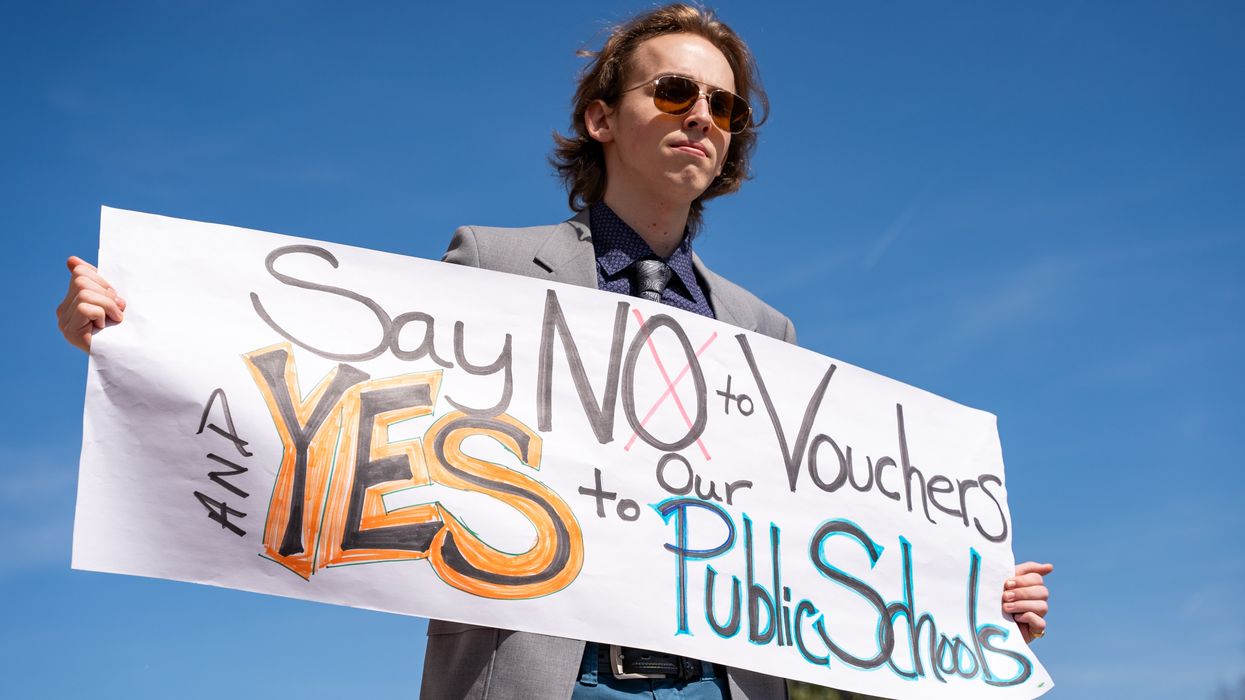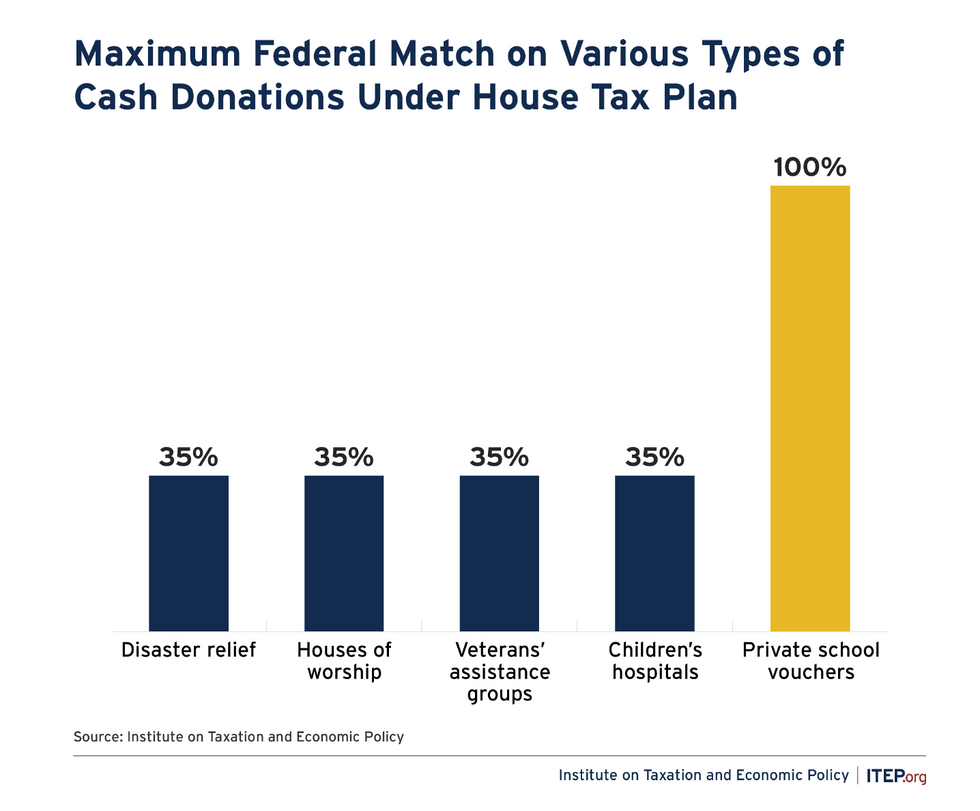Yet when Education Week asked the governors of all 50 states and Washington, D.C. whether they would opt in to the nation's first federal school voucher program that was passed last month as part of Trump's so-called One Big Beautiful Bill Act, only one Democratic governor—Gov. Michelle Lujan Grisham of New Mexico—clearly stated she would not take part in the $26 billion program, which allows taxpayers to claim a 100% tax credit for up to $1,700 in donations to scholarships to private schools, and allow lower-income families to receive scholarship funds.
Lujan Grisham expressed concerns about the lack of accountability measures for private schools that would be funded with tax dollars, a loss of funding and enrollment for public schools, and the possibility of private schools discriminating against children with special needs.
Illinois Gov. JB Pritzker also expressed doubt that his state would participate, saying "it doesn't seem fair" to support a program that "is taking away money from people who can't afford to go to a private school, who would like to go to a public school."
But several other Democratic governors didn't respond to Education Week's query, and others who have been supportive of school vouchers in the past, including Colorado Gov. Jared Polis and Pennsylvania Gov. Josh Shapiro, said they were "reviewing" the program, which does not go into effect until 2027.
"Governor Polis is still reviewing the details of this legislation, but is excited by the possibility of unlocking new federal tax credits for donations to help low-income kids achieve," said Polis' office.
The survey of governors was taken as two reports in The New York Times and The Washington Post detailed the damage school vouchers have already done to public school districts.
As the Times reported Wednesday, a decline in the number of babies being born in the U.S. and the rise of the "school choice" movement, particularly in Republican-controlled states, have led public schools in cities including Orlando, Florida; Newark, New Jersey; and Memphis, Tennessee to confront their emerging enrollment crisis by hiring consultants to help combat right-wing claims that children will suffer if they attend public schools.
Although Florida is one of a few states that has a growing instead of shrinking population of children, its public school systems are facing "significant declines," reported the Times, with more than 400,000 children in the state using the Florida school voucher system, called the universal education savings account—the largest voucher program in the United States.
In Orange County, where Orlando is located, the school-age population has grown by 5% since 2020—but the school district is expecting a 25% decline in kindergarten enrollment this year—and a potential loss of $28 million in federal funding, since schools are funded according to the number of students they enroll.
In Arizona, the Post reported, nearly 89,000 students receive vouchers the state government calls Empowerment Scholarship Accounts, while 62,000 receive taxpayer-supported scholarships for private schools through another voucher program and more than 232,000 students attend charter schools, which are publicly funded but independently run.
The state's embrace of the "school choice" movement left just 75% of Arizona children attending public schools in 2021, according to the Post, and school districts are responding by closing schools. Roosevelt Elementary School District in the Phoenix area will operate just 13 schools this year—a third less than last school year.
"You're taking the same size pie and cutting it into more pieces," Rick Brammer, a consultant who analyzes school enrollment, told the Post. "As we've created and funded alternatives, we've just emptied out school after school from the districts."
Instead of adopting an anti-voucher, vehemently pro-public school stance as a signature issue, the Democratic Party is split on the issue, with a number of Democratic governors backing charter schools and vouchers and some veterans of the Obama administration, including former Education Secretary Arne Duncan, backing a group called Democrats for Education Reform (DFER), which has advocated for states to embrace the federal voucher program in Trump's domestic policy agenda.
As the Times reported Monday, DFER's chief executive, former Democratic Providence, Rhode Island Mayor Jorge Elorza, traveled to a Democratic Governors Association in Madison, Wisconsin this past weekend with the goal of convincing governors who are still "reviewing" the federal voucher program, as many told Education Week, to opt in.
"This is literally free money that is broadly supported by the majority of voters who have steadily drifted away from the party," Elorza told the Times, referring to Black and Latino voters, who some polls have shown believe public schools are failing children. "It just makes sense."
Other Democratic strategists who have previously been involved with DFER have shifted their focus to growing charter school networks in southern states.
Former Georgia state lawmaker Alisha Thomas Searcy, who co-founded the Center for Strong Public Schools Action, which is pushing the charter school effort, told Chalkbeat Tennessee on Monday that the group will not embrace vouchers.
"I want to be clear about what sets us apart," Searcy told the outlet. "It's our commitment to public education. It is foundational for us, and it's nonnegotiable. We're committed to remaining focused on strengthening public schools, not creating pathways that take away from them."
Public education advocates have warned charter schools, like vouchers, drain funding from public schools with less oversight, and research has shown mixed results in terms of academic improvements.
Many Democratic lawmakers, said Tennessee state Rep. Gloria Johnson (D-90), "have an education plan, it’s fully funding public education so every child has a well-resourced classroom, providing wraparound services so families have needed resources, smaller class size, and teacher autonomy."
Jennifer Berkshire, host of the education-focused podcast "Have You Heard," noted that popular Democratic politicians including Kentucky Gov. Andy Beshear and former North Carolina Gov. Roy Cooper have been vehement critics of school vouchers and defenders of robust funding for public education.
"And yet there is intense pressure to get Democrats to embrace vouchers in order to 'stay relevant,'" said Berkshire last week.
Vouchers were resoundingly defeated in a number of states last November—including those that votes for Trump.
A ballot initiative in Kentucky that would have sent public money to private schools was defeated by a 30-point margin, and in Nebraska, nearly every county voted to repeal an existing voucher program. Colorado voters, despite their Democratic governor's support for school vouchers, voted against adding a "right to school choice" to the state constitution.
Considering the broad public disapproval of school privatization, Pepper offered advice to Democrats last week.
"Don't let the far right's demonization of public education fool you," he wrote. "People support their local public schools. Whether it's an attack from Washington, an attack from your statehouse, some new privatization scheme, a billionaire-backed referendum or a candidate who is all-in on attacking public schools—oppose them fiercely and call them out bluntly. Go on offense for public schools, and against efforts to attack public schools."





